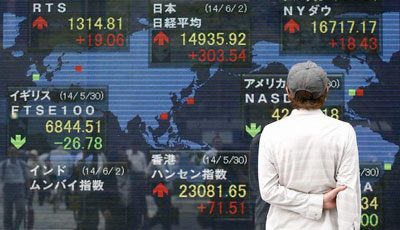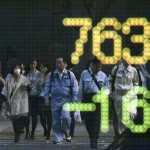Asian Stocks Rise With U.S. Futures, Mexican Peso After Debate

-
Oil near 15-month high on surprise drop in U.S. stockpiles
-
Aussie weakens on jobs data; euro steady ahead of ECB meeting
Asian stocks rose with U.S. equity index futures and the Mexican peso as the third and final American presidential debate was seen strengthening Hillary Clinton’s prospects of winning next month’s election. Oil traded near a 15-month high after an unexpected drop in American stockpiles.
The MSCI Asia Pacific Index climbed to its high for the month, led by energy shares after crude rallied to more than $51 a barrel on Wednesday in New York. The peso, which tends to strengthen when Republican candidate Donald Trump’s chances of victory recede, rose to a six-week high. Australia’s dollar lost ground versus all of its major peers following an unexpected drop in employment, while the euro held near its weakest level since July ahead of a European Central Bank policy meeting.

The latest head-to-head between Clinton and Trump shed little new light on their policies and had less impact on financial markets than their two previous exchanges, which triggered jumps of at least 2 percent in the peso. A CNN/ORC poll of debate watchers showed 52 percent judged Clinton the winner, compared with 39 percent for Trump. Investors are counting down to the Nov. 8 election and a Bloomberg Politics national poll conducted Oct. 14-17 showed a nine percentage-point lead for the Democratic nominee.
“The peso is slightly stronger, possibly implying there was nothing in the debate to significantly swing polling away from Clinton,” said Imre Speizer, a market strategist at Westpac Banking Corp. in Wellington. “Risk sentiment is likely to remain positive in the wake of the debate.”
While the ECB is seen leaving policy unchanged at Thursday’s review, investors will be looking for signals regarding the outlook for its quantitative-easing program. Indonesia also has a central bank meeting and 46 percent of the economists surveyed by Bloomberg forecast interest rates will be cut in Southeast Asia’s biggest economy.
Stocks
The MSCI Asia Pacific Index was 0.5 percent higher as of 12:20 p.m. Tokyo time, with a gauge of energy shares surging 1.7 percent. Japan’s Topix index gained 0.8 percent and Hong Kong’s Hang Seng Index added 0.7 percent, the best performances among regional benchmmarks.
S&P 500 Index futures increased 0.2 percent, while contracts on the U.K.’s FTSE 100 Index gained 0.3 percent.
Currencies
The Bloomberg Dollar Spot Index stabilized near a one-week low. The Aussie weakened 0.5 percent versus the greenback after data showed employment fell by 9,800 in Australia last month, compared with an increase of 15,000 forecast by economists in a Bloomberg survey.
Mexico’s peso strengthened as much as 0.4 percent to 18.4558 per dollar, the highest level since Sept. 8. The currency has advanced about 5 percent this month as opinion polls pointed to a growing likelihood that Trump will lost the coming election. The peso has been sensitive to Trump’s fortunes because he’s proposed renegotiating or ending trade deals with Mexico and blocking remittances to force the country to pay for a wall along the U.S. border.
“With the polls so heavily in Clinton’s favor, markets are priced for her victory,” said Sean Callow, a senior strategist at Westpac Banking Corp. in Sydney. “There probably would only have been a sharp move in markets if Trump had performed extremely well, which wasn’t the case.”
The ringgit rose 0.3 percent as the last session’s increase in oil prices brightened prospects for Malaysia, Asia’s only major net exporter of crude.
The euro was little changed at $1.0973 as traders await the ECB’s policy meeting for signals about its record monetary stimulus efforts. Most economists in a Bloomberg survey predict it will prolong its 1.7 trillion-euro ($1.9 trillion) bond-buying program in December and won’t start to taper its asset purchases before the second half of 2017.
Commodities
Crude oil declined 0.4 percent to $51.39 a barrel in New York, after surging 2.6 percent on Wednesday. Official data showed U.S. supplies dropped by 5.25 million barrels last week to the lowest level since January, while all 10 analysts surveyed by Bloomberg had forecast an increase. Many nations are willing to join the Organization of Petroleum Exporting Countries in cutting production, according to Saudi Arabia’s energy minister.
Bonds
U.S. Treasuries due in a decade were little changed and yielded 1.75 percent. The securities have slumped in October as a bond-market gauge of inflation expectations rose to the highest in five months. The probability of a U.S. rate increase by December has climbed to 64 percent, fed fund futures indicate, from 59 percent at the end of September.
“If you want to buy bonds, it’s not a good time,” said Hiroki Shimazu, an economist and strategist at the Japanese unit of MCP Asset Management in Tokyo. “Whoever wins the presidential election will be negative for the bond market because they’ll plan a large economic stimulus package. There’s higher inflation.”
Source: Bloomberg




























